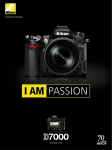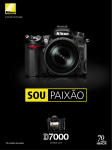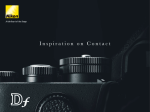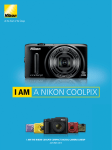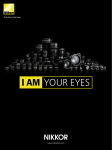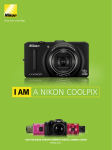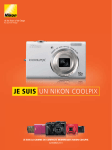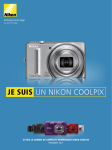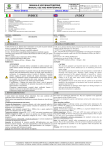Download Samsung SGH-800SB Specifications
Transcript
I AM A GAME CHANGER iamnikon.com Shoot Big, Travel Light Long awaited by passionate photographers everywhere, the new Nikon D600 is an innovative 24.3-megapixel D-SLR in a size and weight never seen before in FX format. Equipped to shoot virtually any subject — from landscapes to portraiture, from still life to action — the D600 renders each with stunning sharpness and all of the benefits that the versatile FX format can offer, such as superior high ISO capability, smooth tonality and beautiful bokeh. Your creative potential will be immeasurable with the latest range of NIKKOR lenses — once they’re attached to this agile and reliable body, it will become clear just how far the D600 can take you. High-end photography was once a privilege enjoyed only by professionals. No longer. See what power lies within your reach. n Smallest and lightest FX-format D-SLR n 24.3-megapixel CMOS sensor n Standard ISO sensitivity range: 100 to 6400 n Approx. 100% frame coverage n 39-point AF system, 7 points compatible with f/8 n Multi-area mode Full HD D-Movie n Double SD card slots compatible with UHS-I Stunning sharpness and clarity from Nikon’s innovative 24.3-megapixel FX-format D-SLR • Exposure: [A] mode, 1/200 second, f/8 • White balance: Auto 1 • Sensitivity: ISO 100 • Picture Control: Standard ©Steve Simon AF-S NIKKOR 70-200mm f/2.8G ED VR II Exquisite detail and subtle tonal range in both highlights and shadows • Exposure: [A] mode, 1/800 second, f/8 • White balance: Direct sunlight • Sensitivity: ISO 100 • Picture Control: Landscape ©Florian Schulz AF-S NIKKOR 24-85mm f/3.5-4.5G ED VR FX 24.3 format megapixels Take your photography to another level Expect stunning detail thanks to an innovative sensor and NIKKOR lenses EXPEED 3 for faster, more intelligent image processing With the goal of increasing pixel count while minimizing high ISO noise, Nikon engineers created a way to get the most out of this camera’s astounding 24.3 effective megapixels using the new FXformat sensor. Using its high S/N (signal-to-noise) ratio, the D600 achieves stunning details, all while keeping noise remarkably low throughout the wide ISO range, and even further reduced at ISO 100. The D600’s large pixel count also means more flexibility in cropping during post-production. Combine these benefits with beautiful bokeh from a large FX-format sensor and a much wider array of compatible NIKKOR lens choices, and DX you can see how much potential the D600 truly offers. Utilized by top-end models like the D4 and D800 series, EXPEED 3 generates extraordinary images. That same image-processing engine is found in the D600. The camera’s 2 4 . 3 - m e g a p i xe l i m a g e f i l e s are large, but EXPEED 3 handles them smoothly and efficiently, which translates into more shooting confidence for you during continuous shooting, card recording, image playback and image transfer. Even with specialized processing features like Active D-Lighting and high ISO noise reduction, the effect on capture speed is minimized. EXPEED 3’s stateof-the-art intelligence successfully reduces noise at higher ISOs without sacrificing fine details, all while broadening the dynamic range and improving color reproduction in significant ways. FX Exquisite color reproduction and rich tonality AF-S NIKKOR 50mm f/1.8G • Exposure: [A] mode, 1/40 second, f/1.8 • White balance: Auto 2 • Sensitivity: ISO 800 • Picture Control: Standard ©Steve Simon ISO 100-6400 Conquer challenging light FX format for more flexible control of light Nikon’s noise reduction method From the bright, harsh noonday sun, to low-lit interiors or evening scenes, the large FX-format sensor handles light so effectively that it delivers exceptional image clarity from ISO 100 up to ISO 6400. When it comes to high ISO settings, Nikon takes image quality very seriously. Strict standards have been put into place to ensure clearer pictures. When the situation demands even more versatility, you can now push your light sensitivity to ISO 50 (Lo 1) or ISO 25600 (Hi 2) equivalent. The higher ISO capability gives the D600 a specific edge, not only creating further handheld shooting opportunities via faster shutter speeds, but also offering video enthusiasts the confidence to shoot in darker places. Thanks to its improved image processing performance and a comprehensive noise reduction system, the D600 successfully minimizes noise at higher ISOs while substantially broadening the standard ISO range. What makes Nikon’s noise reduction method superior is that noise appearing in an image is analyzed, and then optimized noise reduction is applied accordingly. The result: effective noise control in your movies and still images, all without sacrificing the fine details. Amazing noise performance, even at ISO 6400 ISO Hi 2 (ISO 25600 equivalent) ©Florian Schulz • Exposure: [A] mode, 1/60 second, f/8 • White balance: Auto 1 • Sensitivity: ISO 6400 • Picture Control: Neutral ©Steve Simon AF-S NIKKOR 24-70mm f/2.8G ED 39 Quick AF points Response Speed and accuracy for fleeting moments Incredible AF design with compatibility up to f/8 The D600 delivers remarkable AF performance using 39 tightly packed, strategically placed AF points, which work like a net to find your subject and lock it into sharp focus. The nine cross-type sensors in the center give you further accuracy, even when light and contrast are scarce. If the maximum effective aperture of your super-telephoto lens gets as slow as f/8 when attaching a 2.0x teleconverter, you can still count on the D600’s AF performance with seven active AF points — a huge benefit for sports and wildlife shooters. AF-S NIKKOR 200-400mm f/4G ED VR II + AF-S Teleconverter TC-20E III Available focus points according to aperture AF capability at f/8 when shooting with a super-telephoto 800mm • Exposure: [A] mode, 1/800 second, f/8 • White balance: Auto 1 • Sensitivity: ISO 800 • Picture Control: Standard ©Florian Schulz 39 AF points: Compatible with maximum aperture f/5.6 and faster 33 AF points: Compatible with maximum aperture slower than f/5.6 and faster than f/8 7 AF points: Compatible with maximum aperture f/8 AF capability at f/8 : Perform as cross sensors ©Steve Simon : Perform as line sensors Versatile AF-area modes Regardless of your photographic passion, the D600 has AF-area modes optimized to suit your subject matter. Dynamic-area AF is a powerful tool for tracking moving subjects using one priority focus point and the supporting points surrounding it. Switch between 9-point, 21-point and 39-point coverage, depending on your subject’s size, speed, and type of movement. The intelligent 3D-tracking feature allows you more compositional freedom by continuously following moving subjects that stay within your 39 AF points. Try single-point AF when you need pinpoint focus on stationary subjects such as landscapes, portraits or still lifes. On the other hand, the D600’s auto-area AF is an ideal choice for candid shooting, as it automatically detects main subjects. Scene Recognition System for further metering accuracy Speed that responds to your reflexes To ensure you catch the right moment, the D600 shoots up to approx. 5.5 fps in both FX and DX formats — outstanding speed when you consider that each image is 24.3 megapixels. Such speed makes dynamic-area AF even more effective. The power switch strategically encircles the shutter-release button, which means that once turned on, your finger is already in position. The camera is ready to shoot in approx. 0.13 s*, and release time lag has been minimized to approx. 0.052 s*, close to the Nikon D4’s approx 0.042 s*. The right-hand grip has been optimized as well, complemented by a redesign of the shutter-release button area for faster response and less stress to your finger. Utilizing the camera’s built-in 2,016-pixel RGB sensor, Nikon’s Scene Recognition System analyzes each scene’s brightness and color information, and then uses this information to further improve accuracy in autofocus, auto exposure, auto white balance and i-TTL flash metering. Such accuracy instills a vital dose of confidence when using auto control. This is particularly helpful with autofocus, where the Scene Recognition System measures subject identification and tracking information for an enhanced performance by 3D-tracking and auto-area AF. 2,016-pixel RGB sensor Subject tracking Subject identification Highlight analysis Image sensor Light source identification Face detection on image plane AF-S NIKKOR 200-400mm f/4G ED VR II + AF-S Teleconverter TC-20E III Subject tracking * Based on CIPA Guidelines. Dynamic-area AF (9-point) AF-S NIKKOR 600mm f/4G ED VR + AF-S Teleconverter TC-14E II • Exposure: [A] mode, 1/1,250 second, f/5.6 • White balance: Direct sunlight • Sensitivity: ISO 1000 • Picture Control: Standard ©Florian Schulz Phase-detection AF Auto-area AF 3D-tracking Active D-Lighting Exposure control Matrix metering i-TTL balanced fill-flash Flicker reduction Auto white balance Playback Playback zoom of face Contrast-detect AF Face-priority AF Subject-tracking AF –9– –8– 5.5 fps continuous shooting ©Steve Simon RELIABILITY Light, small, dependable Incredible agility when shooting in remote and demanding conditions The most compact FX-format D-SLR camera Accuracy to match both your view and your vision When in the field, photographers always stress the importance of traveling light, and Nikon engineers listened. While designing the D600, many camera components were reassessed and redesigned in order to free up as much internal camera space as possible. The main challenge was to optimize the design surrounding the pentaprism and employ a smaller AF sensor module. The result is an FX-format D-SLR camera that weighs approx. 760 g/1 lb 10.8 oz* — the lightest and smallest in the FX-format category. Where would you go with mobility like this? A precise understanding of ever y element in the frame can be crucial to your compositional intentions, especially when shooting landscapes. The D600 is e q u i p p e d w i t h a n ew l y developed glass prism optical viewfinder that gives you approx. 100% frame coverage. Enjoy a bright and clear view thanks to the large FX-format sensor, plus a focusing screen that is painstakingly designed to make sharp focus fast and intuitive in both autofocus and manual. Unlike the LCD monitor, the viewfinder allows you to truly home in on your subject more steadily and without distractions. The speed of viewfinder shooting also gives you an edge when you need to make quick decisions, which can be crucial while shooting portraits, candid images or action shots. If needed, try the viewfinder’s on-demand grid lines* for simpler, more accurate framing. D4 (FX) 1,180 g/2 lb 9.6 oz* D800 series (FX) 900 g/1 lb 15.7 oz* AF-S NIKKOR 14-24mm f/2.8G ED • Exposure: [M] mode, 25 seconds, f/2.8 • White balance: Color temperature (3,030 K) • Sensitivity: ISO 3200 • Picture Control: Standard ©Florian Schulz Extensive weather sealing D600 (FX) 760 g/1lb 10.8 oz* D7000 (DX) 690 g/1 lb 8.3 oz* * Body only (without battery and cards). Light, rugged magnesium alloy body Nikon engineers trimmed both the size and weight without sacrificing ruggedness. The D600 uses durable magnesium alloy for the top and rear frames, which helps keep it light while protecting the sensitive technologies within from accidental shock. Extensive weather sealing gives the D600 dust- and moisture-proof protection that is just as reliable as its higher-end cousins, the Nikon D800 series, allowing you to work in harsh environments. Double SD card slots compatible with UHS-I When shooting large image files, recording speed and card capacity matter. The D600 comes equipped with double SD card slots that are compatible with the latest UHS-I for faster data transfer. The camera also supports SDXC, the SD cards’ large-capacity standard, to ensure stress-free and productive shooting. Eye-Fi equipped SD cards are also compatible. Having two SD cards offers a number of advantages, including backup recording, RAW/ JPEG separate recording and more. Shutter tested for 150,000 cycles The camera’s highly durable shutter and sequential control mechanism have been tested to 150,000 cycles on fully assembled cameras. While the shutter unit is designed for speeds between 1/4,000 of a second up to 30 s, its intelligent, self-diagnostic shutter monitor automatically monitors actual shutter speeds in order to correct possible variances that can occur over time. Leading-edge LCD monitor with automatic brightness control The large 8-cm (3.2-in.), approx. 921kdot LCD monitor offers you bright, crisp image playback with an extended color reproduction capacity. Its antireflective design offers clear, glarefree performance, even under bright conditions. Set your monitor brightness to Auto, and when the monitor turns on, the camera will automatically adjust the LCD brightness according to the environmental lighting conditions, allowing easy image confirmation in both bright and dimly lit places. * Available only with FX format. – 10 – – 11 – Ambient brightness sensor for automatic monitor brightness control Microphone sensitivity menu D-movie Live view Broadcast quality video at your fingertips Cinematic experience with Full HD quality video Multi-area mode Full HD D-Movie for cinematic freedom Whether you want to record nature, exotic locations or just the magic moments of daily life, Nikon’s broadcast-quality D-Movie demonstrates exquisite moving image integrity, due in part to its 24.3 megapixels and large FX-format sensor. By using the B frame data compression method, the D600 can record 1080p Full HD video at 30p in H.264/ MPEG-4 AVC format for up to 29 min. 59 s* of recording in a single clip. The camera’s intelligent image sensor reads out movie images at faster rates than ever. Thanks to EXPEED 3, Nikon’s latest image-processing engine, you can expect exceptionally smooth gradation, with minimum block noise and beautifully natural movement rendered sharp and clear. Your movies will take on a distinctive look of their own, even when shot in dimly lit locations. Combine these benefits and you’ll begin to realize what new creative opportunities are possible for photographers and video enthusiasts alike. With two formats in one camera, the D600 is designed to explore a variety of moods and perspectives. The camera gives you exquisite Full HD image quality in both FX- and DX-based movie formats. Video enthusiasts will love the shallow depth of field that the large FX-based format can deliver. Action and wildlife shooters can take advantage of the DX-based format and its telephoto effect for extra reach when they need it. Combine the benefits of both formats with an arsenal of NIKKOR lenses and you can begin to see what an incredibly versatile movie-making tool the D600 truly is. Sound level indicator Time-lapse photography menu Comprehensive audio recording control Time-lapse photography made easy The D600 is designed for crisp stereo recording with a built-in external stereo microphone input. Attach the compact ME-1 Stereo Microphone to record clear sound while significantly reducing mechanical noise. An external headphone connector enables you to effectively monitor and control audio in isolation. While the sound level indicator offers visual confirmation of audio level, the microphone sensitivity can be controlled precisely in 20 incremental steps. Creating a time-lapse photography piece once required elaborate calculations and editing, but not any more. Simply designate the interval and duration times through the menu and the D600 does the rest: each series of frames you shoot will be automatically converted and saved as a movie file, ready for your review. Whether it’s traffic, passing clouds or something more creative, the D600 makes it easy to show slow-moving activity at dramatic speeds*. * Replaying rates can be set from 24 times to 36,000 times faster than normal. Note: Movie files of time-lapse photography will be saved in 16:9 aspect ratio. Optimized live view controls for stills or movies View simultaneous live view output on external monitors and record uncompressed video via HDMI The D600 comes with independent live view controls that have been designed specifically for both stills and movie shooting. During still photography shooting, live view is capable of fast contrast-detect AF, operating at the same speed as the D4 and D800 series. It also displays your images with up to approx. 19x magnifying capability for accurate focus confirmation. When shooting movies, on the other hand, the camera’s specialized exposure controls enable smooth exposure transitions for moving subjects. Use live view mode for a clear and accurate way to confirm both the image area and the shooting information so you can concentrate on the shot. In addition to the camera’s LCD monitor, the D600 lets you watch the camera’s output on an external monitor* in real time using an HDMI connection. And for those who need the purest video output for professional quality editing, you can now record uncompressed live view movie footage directly onto an external storage device via HDMI interface. * When video is output through HDMI interface simultaneously with SD card recording, output image through HDMI interface will be smaller than 1,280 x 720. * Total time dependent on frame rate, frame size and movie quality settings. Frame size Frame rate 1,920 x 1,080 30p (29.97 fps) 25p (25 fps) 24p (23.976 fps) Frame size Frame rate 1,280 x 720 60p (59.94 fps) 50p (50 fps) 30p (29.97 fps) 25p (25 fps) DX-based format Note: Options support both high and normal image quality. FX-based format Note: The image here shows two image area options (aspect ratio 16:9) on an FXformat image area for viewfinder shooting or live view photography. – 12 – Time-lapse playback display Live view selector makes switching between still and movie modes smooth and intuitive – 13 – Exclusive features Nikon’s smart, creativity-boosting features Monochrome Vivid Brighter image 1 3 5 2 4 6 Successful HDR image Darker image HDR (High Dynamic Range) for high-contrast landscapes Portrait Landscape operational comfort For Nikon, every detail is vital 1: Grip and shutter button ergonomics 3: Two-axis virtual horizon 5: Intelligent power management The right-hand grip has been carefully redesigned to accommodate a larger variety of hand sizes with such a compact FX-format camera. Small, subtle form changes in the back create a better grip for the thumb, while a slightly deeper and longer front groove provides added stability. Furthermore, the flattened power switch and adjusted angle of the shutter-release button both contribute to making finger movements more natural and strain-free after prolonged use. Whenever you need a level view, simply turn on the smart virtual horizon tool. This lets you see both horizontal dimensions — side-to-side and front-to-back*. Landscape, architecture and still life photographers will benefit from this added level of compositional accuracy. A comprehensive re-working of camera circuitry helps the D600 realize exceptionally efficient power management, while the latest EXPEED 3 image-processing engine aids power-saving even more. Expect longer battery life, as well as the ability to shoot up to approx. 900 shots* on one charge from an EN-EL15 Rechargeable Li-ion Battery, the same type used in the D7000 and D800 series. 2: Strategic layout of mode dials The mode dial was designed to give you quick access to the exposure modes you use the most. As well as the release mode dial, the mode dial incorporates a lock function to prevent unintentional mode switching. The newly added lock release button is easy to operate allowing smooth and secure release. The release mode dial is located on the same axis, providing continuous shooting options as well as the quiet shutter-release mode for even smoother operation. * Front-to-back available only in the LCD monitor. * Based on CIPA Standards. 4: Optimized textures and terminal covers Numerous camera components have been improved for further operational comfort. For example, the rubberized cover for the terminal interface has now been divided into three parts to enhance protection against dust and moisture. On the bottom of the camera, the anti-slip texture has been improved for extra grip when shooting vertically on a tripod. 6: Multi-power battery pack (optional) Some situations require an extra boost of power, such as extended location shooting, making long D-Movies or when shooting time-lapse photography. The MB-D14 MultiPower Battery Pack lets you double your shooting time*. This pack incorporates the same rugged magnesium alloy construction and weather sealing as the D600 body itself. The dedicated shutter-release button and command dials for vertical shooting are an added benefit, especially for portrait photographers. * When EN-EL15 Rechargeable Li-ion Battery is installed in both MB-D14 and D600 body. – 14 – The D600’s HDR feature shoots two frames in a single shutter release: one brighter and one darker. The camera then automatically combines them to create an image covering a broader dynamic range while retaining full saturation and tonality — an effective option for landscape photographers. Direct access to Picture Control Image area options Customize the look of your stills and videos through Picture Control settings by fine-tuning parameters such as sharpening, saturation, and hue. The D600 allows you to access Picture Control instantly and directly from a dedicated button rather than entering the menu. You can also use live view to visually confirm how a customized Picture Control setting will look on the monitor. The D600 allows you to shoot with two different image areas: FX format (35.9 x 24.0 mm) and DX format (23.5 x 15.7 mm). DX format offers an approx. 1.5x telephoto effect by using the required crop. Yet despite this effect, you can still expect the exceptional image quality of 10.4 megapixels for a variety of purposes thanks to the D600’s large pixel count. When a DX NIKKOR lens is used, DX format is automatically selected, and the image area is visually marked in the viewfinder. Picture Control button Auto ISO with auto minimum shutter speed control When using the Auto ISO feature*, the D600 automatically controls your minimum shutter speed based on the focal length of the lens being used. This can be very helpful in reducing camera shake by raising ISO sensitivity, and particularly advantageous when shooting with a zoom lens. Quick adjust display Detail in highlights and shadows: Active D-Lighting * P, S, A, and M modes only. When facing extremely high-contrast lighting beyond the camera’s dynamic range, Nikon’s exclusive Active D-Lighting helps you maintain details in the highlights without losing them in the shadows. Choose an intensity that reflects the levels of contrast in your shooting scenario. Color reproduction at even the Extra-high intensity level has been improved, thanks to the EXPEED 3 image-processing engine. Accurate and flexible auto white balance By effectively identifying every type of light source, Nikon’s auto white balance feature delivers incredibly accurate results. Choose from two options: Auto 1 renders white as white, while Auto 2 renders warmer hues under incandescent light sources. Now with the D600, you can alternate between Auto 1 and 2 during in-camera NEF (RAW) processing even after you shoot. Auto 1 Auto 2 Off Switch between Auto 1 and 2 during in-camera NEF (RAW) processing. Extra high – 15 – NIKKOR lenses NIKKOR: When lens quality truly matters Experience a new level of image quality with the latest FX NIKKOR lenses To draw out the full potential of a large, FX-format 24.3-megapixel sensor, lens quality is crucial. As a long-respected optical manufacturer, Nikon understands that there is no room to compromise when it comes to sharpness, color, tonal gradation or even bokeh. From fast primes to f/2.8 zooms to f/4 zooms with VR, the latest line of FX NIKKOR lenses — many loaded with the worldrenowned Nano Crystal Coat — is fully optimized to deliver the kind of image quality that the D600 truly deserves. 28 60 AF-S Micro NIKKOR 60mm f/2.8G ED 85 AF-S NIKKOR 28mm f/1.8G A fast wide-angle lens with edge-to-edge sharpness and a natural perspective A compact and versatile micro lens with Nano Crystal Coat A fast prime lens, delivering stunning sharpness and quality bokeh from a surprisingly compact body 16-35 24-85 24-120 An ultra-wide-angle zoom lens with VR, enhancing hand-held capability in low light A compact, high-quality standard zoom lens with VR that matches the agility of the D600 A high-quality standard zoom lens with VR and Nano Crystal Coat 14-24 24-70 70-200 An ultra-wide-angle zoom, delivering an edgeto-edge sharpness from the 14 mm wide-end An incredibly reliable, highly balanced standard zoom lens A powerful telephoto zoom lens with VR and stunning image quality throughout the entire zoom range The importance of bokeh quality Your DX lenses, your assets FX-format shooting with fast NIKKOR lenses means incredible control over the quality and quantity of bokeh, which also means added depth and d i m e n s i o n i n yo u r p h o t o g r a p h s . Bokeh can be crucial to how you approach your subject, especially when shooting portraits. Nikon engineers are committed to achieving the most aesthetically pleasing bokeh, based on Nikon’s own set of criteria. Thanks to Nikon’s consistent F-mount design, the D600 makes active use of almost every NIKKOR lens, including DX lenses you may already own. Simply attach a lens to the D600, and the camera automatically recognizes it, setting the required crop. Relatively smaller DX lenses contribute to keeping the camera’s total weight down — a definite advantage when agility DX FX is a must. Lateral chromatic aberration reduction AF-S NIKKOR 16-35mm f/4G ED VR AF-S NIKKOR 14-24mm f/2.8G ED AF-S NIKKOR 24-85mm f/3.5-4.5G ED VR AF-S NIKKOR 24-70mm f/2.8G ED DX image area is indicated visually in the viewfinder – 16 – AF-S NIKKOR 85mm f/1.8G AF-S NIKKOR 24-120mm f/4G ED VR AF-S NIKKOR 70-200mm f/2.8G ED VR II Take advantage of Nikon’s unique solution to reducing chromatic aberration caused by lenses and get even more out of your NIKKOR lens collection. Unlike other correction methods that simply eliminate chromatic aberration, Nikon’s method compensates for these color differences in a resolving index for each color, making it particularly effective in achieving the sharpest images possible. Exquisite sharpness, smooth tonality and pleasing bokeh AF-S NIKKOR 85mm f/1.8G • Exposure: [M] mode, 1/160 second, f/3.2 • White balance: Direct sunlight • Sensitivity: ISO 100 • Picture Control: Portrait ©Noriyuki Yuasa SYSTEM CHART Viewfinder Accessories DK-20C Eyepiece Correction Lenses (-5 to +3 m-1) DG-2 Eyepiece Magnifier SD-9 High-Performance Battery Pack Studio Speedlights** DK-22 Eyepiece Adapter DK-21M Magnifying Eyepiece Two SB-700s were placed in a portable softbox and wirelessly triggered using the D600’s builtin flash. The softbox diffuses light evenly on the subject. NIKKOR Lenses Speedlights SB-910 Speedlight DR-6 Right-Angle Viewing Attachment R1C1 Close-up Speedlight Commander Kit SB-700 Speedlight DK-5 Eyepiece Cap* SB-910/700/400 Speedlights SB-400 Speedlight AS-15 Sync Terminal Adapter SC-28, 29 TTL Remote Cord DK-21 Rubber Eyecup* D igiscoping Accessories MICROPHONE TV Accessories REMOTE CONTROL, GPS Accessories TV monitor** FSA-L1 Fieldscope Digital SLR Camera Attachment FSA-L2 Fieldscope Digital SLR Camera Attachment HDMI Cable** SB-400 SB-700 SB-910 GP-1 GPS Unit ME-1 Stereo Microphone MC-DC2 Remote Cord AC Adapters, Batteries and BATTERY PACKS AF-S NIKKOR 28 mm f/1.8G •Exposure: [M] mode, 1/25 second, f/4 • White balance: Auto 1 • Sensitivity: ISO 400 • Picture Control: Portrait ©Steve Simon EN-EL15 Rechargeable Li-ion Battery* Boost your creativity with simple wireless lighting The D600 is designed to work together with the Nikon Creative Lighting System for an unmatched level of lighting accuracy and flexibility. Unequaled in versatility and portability, the advantages of this partnership are best experienced via Advanced Wireless Lighting. Using the D600’s built-in flash as a commander, you can trigger your remote off-camera Speedlights wirelessly with ease, making lighting as creative and comprehensive as your imagination can take it. A vital ingredient of stunning portraiture and countless other subjects. MH-25 Battery Charger* To draw the maximum potential out of NEF files, Nikon’s exclusive ViewNX 2 and Capture NX 2 software are the only true choices. Each NEF file contains an incredible amount of data inherent to your Nikon system. At the time of RAW editing, ViewNX 2 and Capture NX 2 can fully utilize this data where others cannot. Nikon software truly understands the characteristics of the D600’s sensor and the settings of your lenses and Speedlights, which means you get the best results possible. Capture NX 2 (optional) All-in-one software with a user-friendly interface, ViewNX 2 allows you to browse and edit your pictures and movies, as well as share them using Nikon’s photo-sharing and storage service, my Picturetown, and more. A powerful tool for more advanced and elaborate photo editing, Capture NX 2 features intuitive Color Control Point technology that drastically simplifies many image enhancement procedures. Now compatible with the 64-bit processing of your computer. – 18 – BM-14 Monitor Cover* Case Smart device Accessories WU-1b Wireless Mobile Adapter Computer-Related Accessories SD memory card** CF-DC5 Semi-Soft Case Smart device (Android/iOS based)*** PC card adapter** SD memory card reader** Printer** Wireless Mobile Adapter Utility EH-5b AC Adapter Personal computer** UC-E15 USB Cable* Capture NX 2 ViewNX 2* Camera Control Pro 2 The D600 on assignment Wireless camera control via smart devices Attaching the optional WU-1b Wireless Mobile Adapter to the D600 allows your wireless, WU-1b LAN-equipped smart device* to control your camera remotely. Now you can release the shutter, select a focus point and shoot in Time mode. Once the images are in your hand, you can share them with the world instantly through social networking services (SNS) or e-mail. * Compatible with smart devices using Android OS. Compatibility with iOS also available from fall, 2012. Note: This function requires installing a Wireless Mobile Adapter Utility to the smart device prior to use. This can be downloaded from Google Play at no charge. ViewNX 2 (bundled) Six R6/AA-size batteries** EP-5B Power Connector Headphone** HDMI input video recorder** * Supplied accessories ** Non-Nikon products *** Can be downloaded for free from Google Play (Android-version) or Apple App Store (iOS-version) Commander mode menu Get the most out of Nikon’s RAW file – the NEF MB-D14 Multi-Power Battery Pack HEADPHONE ML-L3 Remote Control As a documentary photographer, I capture strong images when I can respond quickly. The D600 is small, light and fast enough to have with me at all times, rendering 24.3-megapixel fullframe images that are big and beautiful. I can even crop tightly to perfect my composition and still maintain stunning detail. The D600’s intuitive Steve Simon (U.S.A.) Documentary operation and 39-point autofocus Location: Morocco system give me complete control over the imaging process. Technical concerns fade away, and the camera becomes an extension of my eye, letting me work unencumbered. Using the bright viewfinder’s approx. 100% frame coverage, I can confidently record authentic, storytelling moments that will never be repeated. When shooting portraits, I’m often at a lens’ widest apertures for the dreamlike bokeh that a full-frame sensor achieves with fast NIKKOR glass. Now I don’t hesitate to use ISO 6400 to capture the atmosphere of a low-light scene. Live view lets me compose my landscapes precisely, its two-axis smart virtual horizon helping me center the camera and keep distortion minimized. The D600‘s new broadcast quality D-Movie, HDR (High Dynamic Range) and time-lapse photography features are so easy to use they are now taking my work into new and unexpected directions. This camera inspires my photographic passions and helps my creativity soar. I am often asked to recommend the best camera for nature photographers, and this incredibly versatile new camera is it. In nature photography, weight often matters, and here you have the finest Nikon technology in a rugged, full-frame camera body that is impressively compact and lightweight. With 24.3 megapixels, a ver y fast Florian Schulz (Germany) Nature and wildlife autofocus, 5.5 frames per second and Location: U.S.A./Canada fantastic high ISO capabilities, it has exactly what nature photographers want. The D600 gives you access to NIKKOR’s beautiful array of wide-angle lenses like the AF-S NIKKOR 14-24mm f/2.8G ED, but also lets you use autofocus at f/8, even when using my favorite long lens, the AF-S NIKKOR 200-400mm f/4G ED VR II with a 2x teleconverter. This versatility extends to video as well. It delivers fantastic Full HD video files, and with the large FX-format sensor, you can shoot cinematically with a shallow depth of field, and the camera’s lightweight design makes it easier to use on cranes and magic arms. I love creating multimedia presentations, and for that, the new time-lapse photography feature is a very handy little gizmo. Never before has there been such a compact camera loaded with so many fantastic features. Now there are no limits to your creativity. The D600 is a true all-rounder. For more information about the Nikon D600, please visit: http://imaging.nikon.com Nikon Digital SLR Camera D600 Specifications Type of camera Lens mount Effective pixels Image sensor Total pixels Dust-reduction system Detection range Lens servo Focus point AF-area modes Focus lock Built-in flash Guide number Flash control Flash modes Flash compensation Flash bracketing Flash-ready indicator Accessory shoe Nikon Creative Lighting System (CLS) Sync terminal White balance White balance bracketing Live view modes Live view lens servo AF-area modes Autofocus Movie metering Movie metering method Frame size (pixels) and frame rate File format Video compression Audio recording format Audio recording device Maximum length Other movie options Monitor # Single-lens reflex digital camera Nikon F mount (with AF coupling and AF contacts) 24.3 million 35.9 × 24.0 mm CMOS sensor (Nikon FX format) 24.7 million Image sensor cleaning, Image Dust Off reference data (optional Capture NX 2 software required) Image size (pixels) • FX format (36×24): 6,016 × 4,016 (L), 4,512 × 3,008 (M), 3,008 × 2,008 (S) • DX format (24×16): 3,936 × 2,624 (L), 2,944 × 1,968 (M), 1,968 × 1,312 (S) • FX-format photographs taken in movie live view: 6,016 × 3,376 (L), 4,512 × 2,528 (M), 3,008 × 1,688 (S) • DX-format photographs taken in movie live view: 3,936 × 2,224 (L), 2,944 × 1,664 (M), 1,968 × 1,112 (S) File format • NEF (RAW): 12 or 14 bit, lossless compressed or compressed • JPEG: JPEG-Baseline compliant with fine (approx. 1:4), normal (approx. 1:8) or basic (approx. 1:16) compression (Size priority); Optimal quality compression available • NEF (RAW)+JPEG: Single photograph recorded in both NEF (RAW) and JPEG formats Picture Control System Standard, Neutral, Vivid, Monochrome, Portrait, Landscape; selected Picture Control can be modified; storage for custom Picture Controls Storage media SD (Secure Digital) and UHS-I compliant SDHC and SDXC memory cards Double card slots Slot 2 can be used for overflow or backup storage or for separate storage of copies created using NEF+JPEG; pictures can be copied between cards File system DCF (Design Rule for Camera File System) 2.0, DPOF (Digital Print Order Format), Exif (Exchangeable Image File Format for Digital Still Cameras) 2.3, PictBridge Viewfinder Eye-level pentaprism single-lens reflex viewfinder Frame coverage • FX (36×24): Approx. 100% horizontal and 100% vertical • DX (24×16): Approx. 97% horizontal and 97% vertical Magnification Approx. 0.7× (50 mm f/1.4 lens at infinity, -1.0 m-1) Eyepoint 21 mm (-1.0 m-1; from center surface of viewfinder eyepiece lens) Diopter adjustment -3 to +1 m-1 Focusing screen Type B BriteView Clear Matte Mark VIII screen with AF area brackets (framing grid can be displayed) Reflex mirror Quick return Depth-of-field preview Pressing depth-of-field preview button stops lens aperture down to value selected by user (A and M modes) or by camera (other modes) Lens aperture Instant return, electronically controlled Compatible lenses Compatible with AF NIKKOR lenses, including type G and D lenses (some restrictions apply to PC lenses), DX lenses [using DX (24×16) image area], AI-P NIKKOR lenses, and non-CPU AI lenses (A and M modes only); IX-NIKKOR lenses, lenses for the F3AF, and non-AI lenses cannot be used The electronic rangefinder can be used with lenses that have a maximum aperture of f/5.6 or faster (the electronic rangefinder supports the center 7 focus points with lenses that have a maximum aperture of f/8 or faster and the center 33 focus points with lenses that have a maximum aperture of f/6.8 or faster) Shutter type Electronically-controlled vertical-travel focal-plane shutter Shutter speed 1/4,000 to 30 s in steps of 1/3 or 1/2 EV, bulb, time (requires optional ML-L3 Remote Control), X200 Flash sync speed X=1/200 s; synchronizes with shutter at 1/250 s or slower (flash range drops at speeds between 1/200 and 1/250 s) Release modes S (single frame), CL (continuous low speed), CH (continuous high speed), Q (quiet shutterrelease), E (self-timer), (remote control), MUP (mirror up) Frame advance rate Approx. 1 to 5 fps (CL) or approx. 5.5 fps (CH) Self-timer 2 s, 5 s, 10 s, 20 s; 1 to 9 exposures at intervals of 0.5, 1, 2 or 3 s Remote release modes Delayed remote, quick-response remote, remote mirror-up Exposure metering TTL exposure metering using 2,016-pixel RGB sensor Metering method • Matrix: 3D color matrix metering II (type G and D lenses); color matrix metering II (other CPU lenses); color matrix metering available with non-CPU lenses if user provides lens data • Center-weighted: Weight of 75% given to 12-mm circle in center of frame; diameter of circle can be changed to 8, 15 or 20 mm, or weighting can be based on average of entire frame (non-CPU lenses use 12-mm circle or average of entire frame) • Spot: Meters 4-mm circle (about 1.5% of frame) centered on selected focus point (on center focus point when non-CPU lens is used) Metering range • Matrix or center-weighted metering: 0 to 20 EV (ISO 100, f/1.4 lens, 20°C/68°F) • Spot metering: 2 to 20 EV Exposure meter couplingCombined CPU and AI Exposure modes Auto (auto; auto [flash off]), scene (portrait, landscape, child, sports, close up, night portrait, night landscape, party/indoor, beach/snow, sunset, dusk/dawn, pet portrait, candlelight, blossom, autumn colors, food, silhouette, high key, low key), programmed auto with flexible program (P), shutter-priority auto (S), aperture-priority auto (A), manual (M), U1 (user settings 1), U2 (user settings 2) Exposure compensation -5 to +5 EV in increments of 1/3 or 1/2 EV Exposure bracketing 2 to 3 frames in steps of 1/3, 1/2, 2/3, 1, 2 or 3 EV Exposure lock Luminosity locked at detected value with AE-L/AF-L button ISO sensitivity ISO 100 to 6400 in steps of 1/3 or 1/2 EV; can also be set to approx. 0.3, 0.5, 0.7 or 1 EV (ISO (Recommended Exposure Index) 50 equivalent) below ISO 100 or to approx. 0.3, 0.5, 0.7, 1 or 2 EV (ISO 25600 equivalent) above ISO 6400; auto ISO sensitivity control available Active D-Lighting Can be selected from auto, extra high, high, normal, low or off ADL bracketing 2 frames using selected value for one frame or 3 frames using preset values for all frames Autofocus Nikon Multi-CAM 4800 autofocus sensor module with TTL phase detection, fine-tuning, 39 focus points (including 9 cross-type sensors; the center 33 points are available at apertures slower than f/5.6 and faster than f/8, while the center 7 points are available at f/8), and AFassist illuminator (range approx. 0.5 to 3 m/1 ft 8 in. to 9 ft 10 in.) Printed in Holland Code No. 6CE12060 (1209/A)K Playback USB HDMI output Accessory terminal Audio input Audio output Supported languages Battery Battery pack AC adapter Tripod socket Dimensions (W × H × D) Weight Operating environment Supplied accessories (may differ by country or area) -1 to +19 EV (ISO 100, 20°C/68°F) • Autofocus (AF): Single-servo AF (AF-S); continuous-servo AF (AF-C); auto AF-S/AF-C selection (AF-A); predictive focus tracking activated automatically according to subject status • Manual focus (M): Electronic rangefinder can be used Can be selected from 39 or 11 focus points Single-point AF, 9-, 21- or 39-point dynamic-area AF, 3D-tracking, auto-area AF Focus can be locked by pressing shutter-release button halfway (single-servo AF) or by pressing AE-L/AF-L button i, k, p, n, o, s, w: Auto flash with auto pop-up P, S, A, M, 0 : Manual pop-up with button release Approx. 12/39, 12/39 with manual flash (m/ft, ISO 100, 20°C/68°F) TTL: i-TTL flash control using 2,016-pixel RGB sensor is available with built-in flash and SB-910, SB-900, SB-800, SB-700, SB-600 or SB-400; i-TTL balanced fill-flash for digital SLR is used with matrix and center-weighted metering, standard i-TTL flash for digital SLR with spot metering Auto, auto with red-eye reduction, auto slow sync, auto slow sync with red-eye reduction, fill-flash, red-eye reduction, slow sync, slow sync with red-eye reduction, rear-curtain with slow sync, rear-curtain sync, off; auto FP high-speed sync supported -3 to +1 EV in increments of 1/3 or 1/2 EV 2 to 3 frames in steps of 1/3, 1/2, 2/3, 1, 2 or 3 EV Lights when built-in flash or optional flash unit is fully charged; flashes after flash is fired at full output ISO 518 hot-shoe with sync and data contacts and safety lock Advanced Wireless Lighting supported with built-in flash, SB-910, SB-900, SB-800 or SB-700 as a master flash and SB-600 or SB-R200 as remotes, or SU-800 as commander; built-in flash can serve as master flash in commander mode; auto FP high-speed sync and modeling illumination supported with all CLS-compatible flash units except SB-400; Flash Color Information Communication and FV lock supported with all CLS-compatible flash units AS-15 Sync Terminal Adapter (available separately) Auto (2 types), incandescent, fluorescent (7 types), direct sunlight, flash, cloudy, shade, preset manual (up to 4 values can be stored), choose color temperature (2,500 K to 10,000 K); all with fine-tuning 2 to 3 frames in steps of 1, 2 or 3 Live view photography (still images), movie live view (movies) • Autofocus (AF): Single-servo AF (AF-S); full-time servo AF (AF-F) • Manual focus (M) Face-priority AF, wide-area AF, normal-area AF, subject-tracking AF Contrast-detect AF anywhere in frame (camera selects focus point automatically when face-priority AF or subject-tracking AF is selected) TTL exposure metering using main image sensor Matrix • 1,920 × 1,080; 30p (progressive), 25p, 24p • 1,280 × 720; 60p, 50p, 30p, 25p Actual frame rates for 60p, 50p, 30p, 25p, and 24p are 59.94, 50, 29.97, 25, and 23.976 fps respectively; options support both high and normal image quality MOV H.264/MPEG-4 Advanced Video Coding Linear PCM Built-in monaural or external stereo microphone; sensitivity adjustable Approx. 29 min. 59 s (20 min. depending on frame size/rate and movie quality settings) Index marking, time-lapse photography 8-cm (3.2-in.), approx. 921k-dot (VGA), low-temperature polysilicon TFT LCD with approx. 170° viewing angle, approx. 100% frame coverage, and automatic monitor brightness control using ambient brightness sensor Full-frame and thumbnail (4, 9, 72 images or calendar) playback with playback zoom, movie playback, photo and/or movie slide shows, histogram display, highlights, photo information, GPS data display and auto image rotation Hi-Speed USB Type C mini-pin HDMI connector Remote cord: MC-DC2 (available separately) GPS unit: GP-1 (available separately) Stereo mini-pin jack (3.5-mm diameter; plug-in power supported) Stereo mini-pin jack (3.5-mm diameter) Arabic, Chinese (Simplified and Traditional), Czech, Danish, Dutch, English, Finnish, French, German, Greek, Hindi, Hungarian, Indonesian, Italian, Japanese, Korean, Norwegian, Polish, Portuguese (Portugal and Brazil), Romanian, Russian, Spanish, Swedish, Thai, Turkish, Ukrainian One EN-EL15 Rechargeable Li-ion Battery Optional MB-D14 Multi-Power Battery Pack with one EN-EL15 Rechargeable Li-ion Battery or six AA alkaline, Ni-MH, or lithium batteries EH-5b AC Adapter; requires EP-5B Power Connector (available separately) 1/4 in. (ISO 1222) Approx. 141 × 113 × 82 mm/ 5.6 × 4.4 × 3.2 in. Approx. 850 g/1 lb 14.0 oz with battery and memory card but without body cap; approx. 760 g/ 1 lb 10.8 oz (camera body only) Temperature: 0 to 40°C/32 to 104°F; humidity: 85% or less (no condensation) EN-EL15 Rechargeable Li-ion Battery, MH-25 Battery Charger, DK-5 Eyepiece Cap, DK-21 Rubber Eyecup, UC-E15 USB Cable, AN-DC8 Camera Strap, BM-14 LCD Monitor Cover, BF-1B Body Cap, BS-1 Accessory Shoe Cover, ViewNX 2 CD-ROM • PictBridge is a trademark. The SD, SDHC and SDXC logos are trademarks of the SD Card Association. • HDMI, the HDMI logo and HighDefinition Multimedia Interface are trademarks or registered trademarks of HDMI Licensing, LLC. • Google, Android and Google Play are registered trademarks or trademarks of Google Inc. • Wi-Fi is a registered trademark of the Wi-Fi Alliance ®. • Products and brand names are trademarks or registered trademarks of their respective companies. • Images in viewfinders, on LCDs and monitors shown in this brochure are simulated.











